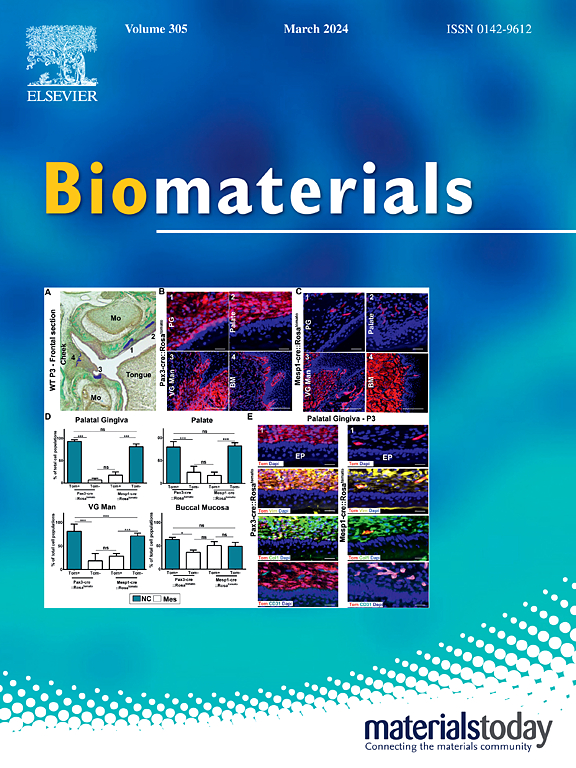Magnesium peroxide-based biomimetic nanoigniter degrades extracellular matrix to awake T cell-mediated cancer immunotherapy
IF 12.8
1区 医学
Q1 ENGINEERING, BIOMEDICAL
引用次数: 0
Abstract
As the elite force of our immune system, T cells play a determining role in the effectiveness of cancer immunotherapy. However, the clever tumor cells construct a strong immunosuppressive tumor microenvironment (TME) fortress to resist the attack of T cells. Herein, a magnesium peroxide (MP)-based biomimetic nanoigniter loaded with doxorubicin (DOX) and metformin (MET) is rationally designed (D/M-MP@LM) to awake T cell-mediated cancer immunotherapy via comprehensively destroying the strong TME fortress. The nanoigniter not only effectively initiate CD8+ T cell-mediated immune response by promoting the presentation of tumor antigens, but also greatly facilitate the infiltration of T cells by degrading rigid extracellular matrix (ECM). More importantly, the nanoigniter significantly augment the effector functions of infiltrated CD8+ T cells by Mg2+-mediated metalloimmunotherapy and avoid the exhaustion of CD8+ T cells by improving the acidic TME. Thus, the nanoigniter comprehensively awakes T cells and achieves remarkable tumor inhibition efficacy.

基于过氧化镁的仿生纳米点火器降解细胞外基质,唤醒T细胞介导的癌症免疫治疗。
作为我们免疫系统的精英力量,T细胞在癌症免疫治疗的有效性中起着决定性的作用。然而,聪明的肿瘤细胞构建了一个强大的免疫抑制肿瘤微环境(TME)堡垒来抵抗T细胞的攻击。本文合理设计了一种负载阿霉素(DOX)和二甲双胍(MET)的基于氧化镁(MP)的仿生纳米点火剂(D/M-MP@LM),通过全面破坏强TME堡垒来唤醒T细胞介导的癌症免疫治疗。纳米点火剂不仅通过促进肿瘤抗原的呈递,有效启动CD8+ T细胞介导的免疫应答,而且通过降解刚性细胞外基质(ECM),极大地促进T细胞的浸润。更重要的是,纳米点火剂通过Mg2+介导的金属免疫疗法显著增强了浸润CD8+ T细胞的效应功能,并通过改善酸性TME避免了CD8+ T细胞的衰竭。因此,纳米点火剂全面唤醒T细胞,取得了显著的抑瘤效果。
本文章由计算机程序翻译,如有差异,请以英文原文为准。
求助全文
约1分钟内获得全文
求助全文
来源期刊

Biomaterials
工程技术-材料科学:生物材料
CiteScore
26.00
自引率
2.90%
发文量
565
审稿时长
46 days
期刊介绍:
Biomaterials is an international journal covering the science and clinical application of biomaterials. A biomaterial is now defined as a substance that has been engineered to take a form which, alone or as part of a complex system, is used to direct, by control of interactions with components of living systems, the course of any therapeutic or diagnostic procedure. It is the aim of the journal to provide a peer-reviewed forum for the publication of original papers and authoritative review and opinion papers dealing with the most important issues facing the use of biomaterials in clinical practice. The scope of the journal covers the wide range of physical, biological and chemical sciences that underpin the design of biomaterials and the clinical disciplines in which they are used. These sciences include polymer synthesis and characterization, drug and gene vector design, the biology of the host response, immunology and toxicology and self assembly at the nanoscale. Clinical applications include the therapies of medical technology and regenerative medicine in all clinical disciplines, and diagnostic systems that reply on innovative contrast and sensing agents. The journal is relevant to areas such as cancer diagnosis and therapy, implantable devices, drug delivery systems, gene vectors, bionanotechnology and tissue engineering.
 求助内容:
求助内容: 应助结果提醒方式:
应助结果提醒方式:


